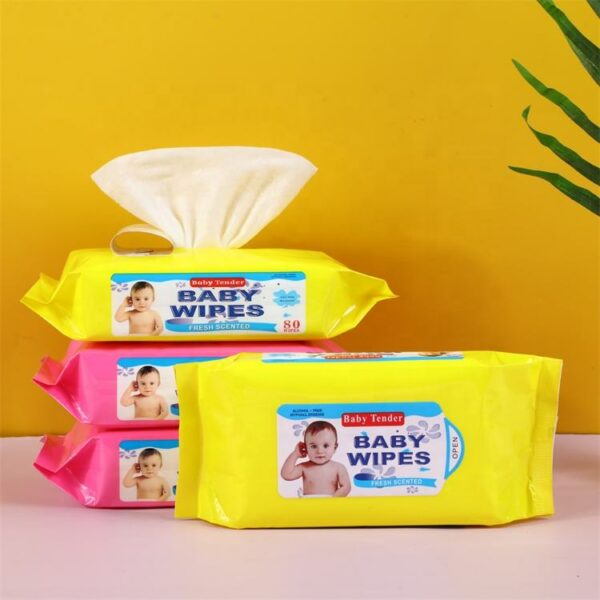Wet wipes play a crucial role in maintaining overall hygiene for babies, especially in situations where traditional cleansing isn’t feasible, such as while traveling or during diaper changes. Here’s how they contribute:
- Convenience: Wet wipes offer quick and convenient cleaning solutions when access to water and soap is limited. They provide an easy way to clean baby’s skin during diaper changes, after feedings, or when on-the-go.
- Effective Cleansing: Wet wipes effectively remove dirt, residue, urine, feces, and other impurities from a baby’s delicate skin, ensuring cleanliness between baths or during messy situations.
- Gentle on Skin: Baby wet wipes are formulated to be gentle and non-irritating, specifically designed for sensitive baby skin. They contain mild cleansing agents and moisturizers to prevent dryness and irritation.
- Preventing Skin Irritation: Wet wipes can help prevent diaper rash and other skin irritations by promptly removing moisture and irritants from the skin. They keep the diaper area clean and dry, reducing the risk of rashes.
- Hygienic Solution: In situations where access to clean water or facilities for proper cleansing isn’t available, wet wipes offer a hygienic alternative for maintaining cleanliness.
- Multi-Purpose Usage: Apart from diaper changes, wet wipes can be used for cleaning other body parts, such as hands, face, and even surfaces that come into contact with the baby.
- Travel and Outings: Wet wipes are highly portable and convenient during travel or outings. They provide an instant and effective cleaning solution, especially in situations where sinks or cleansing facilities aren’t easily accessible.
- Reducing Bacterial Transfer: Wet wipes with antibacterial properties can help reduce the transfer of bacteria, providing an added layer of protection against infections or illnesses.
- Quick Refreshment: They offer a quick refreshment during warm weather or after activities, providing a cooling sensation and removing sweat or dirt.
While wet wipes are convenient for maintaining baby hygiene, they’re not a substitute for regular bathing or proper cleansing with soap and water. Extended reliance solely on wet wipes may not thoroughly cleanse the skin or provide the benefits of a complete bathing routine. However, they offer a practical and effective solution for maintaining hygiene when traditional cleansing isn’t immediately possible.
What advice would you offer to parents incorporating baby wet wipes into their baby care routine?
Here’s some advice for parents incorporating baby wet wipes into their baby care routine:
- Check Ingredients: Opt for wet wipes specifically designed for babies with gentle, hypoallergenic, and fragrance-free formulas to minimize the risk of skin irritation or allergies.
- Perform Patch Test: Before using new wipes, perform a patch test on a small area of your baby’s skin to ensure there’s no adverse reaction or irritation.
- Use for Specific Needs: Reserve wet wipes for specific purposes like diaper changes, cleaning hands and face, or quick cleanups. Avoid excessive use for every little mess to prevent skin dryness.
- Dispose of Properly: Dispose of used wipes in a trash receptacle, wet wipes for babies not in the toilet, to prevent clogs and environmental issues.
- Check for Sensitivity: Monitor your baby’s skin for any signs of sensitivity or irritation after using wet wipes. If there’s a reaction, switch to a different brand or consider using a different product.
- Seal Properly: Always reseal the pack or container after use to retain moisture and prevent the wipes from drying out.
- Store Correctly: Keep the wipes in a cool, dry place away from direct sunlight to maintain their freshness and effectiveness.
- Consider Eco-Friendly Options: If possible, explore biodegradable or eco-friendly wet wipe alternatives to reduce environmental impact.
- Avoid Wipes on Open Wounds or Rashes: Refrain from using wet wipes on open wounds, cuts, or severe rashes to prevent further irritation.
- Supplement with Water and Cloth: For particularly sensitive moments, consider using plain water and soft cloths instead of wipes, especially if the baby has a skin condition.
- Use Moderately: While convenient, avoid excessive use of wet wipes as they might strip away natural oils from the baby’s skin, causing dryness or irritation.
- Read Instructions: Follow the manufacturer’s instructions on the pack for proper usage and disposal guidelines.
- Travel Essentials: Keep a pack of wet wipes in your diaper bag for convenient use during outings or travels.
- Be Cautious with Fragranced Wipes: Fragranced wipes might contain chemicals that could be harsh on sensitive skin. Consider unscented options.
- Consult with a Pediatrician: If your baby has specific skin conditions or allergies, consult a pediatrician for recommendations on the best wet wipes suited for your baby.
By incorporating these tips into the baby care routine, parents can effectively utilize wet wipes while ensuring their baby’s skin remains clean, healthy, and free from irritation.
